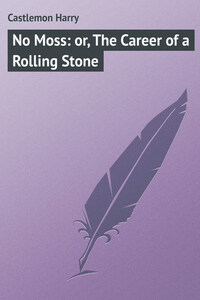CHAPTER I
THE MILITARY ACADEMY
“Well, now, I am disgusted.”
“So am I. I call it a most unusual proceeding.”
“That is a very mild term to be applied to it. I call it an outrage. The Professor has deliberately gone to work to disgrace the school and every student in it.”
“That’s my opinion. I shall give my father a full history of the case in the next letter I write to him; and I incline to the belief that he will order me to pack my trunk and start for home.”
“I know that is what my father will do. Why, fellows, just think of it for a moment! What if this street gamin, who has been brought here as the Professor’s pet, should accidentally win a warrant at the next examination?”
“Or a commission! That would be worse yet. Wouldn’t a gentleman’s son look nice obeying his orders – the orders of a bootblack?”
“I’ll never do that. I’ll stay in the guard-house until I am gray-headed first.”
“Well, I won’t. I’ll go home first.”
This conversation took place one cold, frosty morning in the latter part of January, 18 – , among the members of a little party of boys who were walking up the path that led to the door of the Bridgeport Military Academy. There were a dozen of them in all, and their ages varied from thirteen to sixteen years. They looked like young soldiers, dressed as they were in their neat, well-fitting uniforms of cadet gray, set off by light blue trimmings; but it seems that they were anything but good soldiers just then, for their words indicated a determination on their part to rebel against lawful authority.
The Bridgeport Military School was a time-honored, wealthy, and aristocratic institution. It was modeled after the school at “the Point,” and although its course of study differed materially from that pursued at the national academy, its rules of discipline were almost the same. It was intended to fit boys for college, for business, for civil or mining engineering, or for West Point, if they wanted to go there and could command influence enough to secure the appointment; and in order that they might begin early in life to realize the majesty and dignity of law, and to see the necessity of submitting to it as becomes good citizens of the republic, they were put through a course of military drill as strict as that to which they would have been subjected if they had been private soldiers in the regular army.
The majority of the students – there were nearly three hundred of them in all-were deeply in love with the school, and with every body and every thing connected with it. Although they were obliged to study hard for seven months in the year to avoid being dropped from their classes, and to watch themselves closely in order to keep within the rules, they were allowed two seasons of rest and recreation during the year; a faithful student could always obtain a pass for an evening, provided his standing as a soldier was what it should be, and warrants and commissions were to be obtained by anybody who was willing to work for them. More than that, the institution was endeared to them by a thousand old-time associations. The fathers of some of the present students had sat in those same seats, pronounced their orations from that very rostrum, handled those same muskets and swords, and been drilled at the identical guns that still composed the battery, and their sons had heard them speak in the highest terms of the benefits derived from the instructions they had there received during the days of their boyhood. Under these circumstances it was no wonder that the students took pride in their school, and that the most of them had come there with the determination that no act of theirs should in any way detract from its high and long-established reputation.
But if these were the sentiments of some of the boys, there was a small but busy minority who cherished feelings that were exactly the reverse – boys who had been sent there because they could not be controlled at home, who were restive under the restraints that were imposed upon them, and whose sole object was to complete the course and get away from the school with as little trouble to themselves as possible. These were the fellows who were always in trouble. They did not mind their hard lessons so much as they did the fatiguing drills with muskets and broadswords. They envied the officers in their class on account of the authority they possessed, the extra privileges that fell to their lot, and the respect they demanded from the rest of the students; but they were not willing to work for a commission themselves, and they did not like those who were. They ran the guard at every opportunity to eat pancakes with Cony Ryan, who was quite as important a personage at Bridgeport as Benny Havens is, or used to be, at West Point, and did penance for it the next Saturday by performing extra duty as sentries with bricks in their knapsacks. When they saluted a member of the class above them, as the law required them to do, they did it in a very sullen and ungracious manner; but if a member of the class below them neglected his duty in this respect, they were prompt to take him to task for it.














